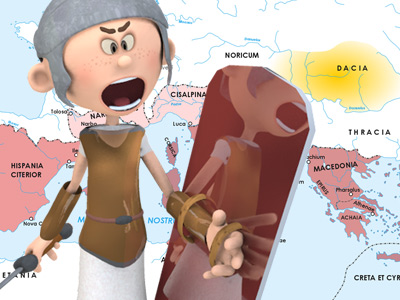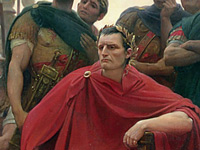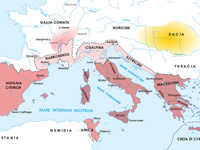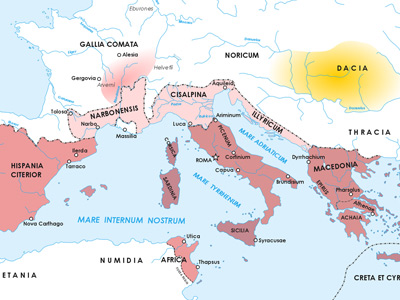Great Roman Civil War (49–45 BC)

Greek, Illyrian and African Campaigns
From Brundisium, Caesar with 7 legions crossed the Strait of Otranto to the gulf of Valona, not Palaesta in Epirus (modern Palase/Dhermi, Albania), as reported by Lucan. In that time, Pompey considered three courses of action: (i) alliance with the King of Parthia, an erstwhile ally, far to the east; (ii) invade Italy with his naval superiority; and (iii) confronting Julius Caesar in decisive battle. A Parthian alliance was unfeasible, a Roman general fighting Roman The Roman Republic was a form of government of Rome and the era of the classical Roman civilization when it was run through public representation of the Roman people. Beginning with the overthrow of the Roman Kingdom (traditionally dated to 509 BC) and ending in 27 BC with the establishment of the Roman Empire, Rome's control rapidly expanded during this period - from the city's immediate surroundings to hegemony over the entire Mediterranean world. legions with foreign troops was craven; and the military risk of an Italian invasion was politically unsavoury, because, the Italians (who thirty years earlier had rebelled against Rome) might rise against him; thus, on councilor's advice, Pompey decided to fight Caesar
The Roman Republic was a form of government of Rome and the era of the classical Roman civilization when it was run through public representation of the Roman people. Beginning with the overthrow of the Roman Kingdom (traditionally dated to 509 BC) and ending in 27 BC with the establishment of the Roman Empire, Rome's control rapidly expanded during this period - from the city's immediate surroundings to hegemony over the entire Mediterranean world. legions with foreign troops was craven; and the military risk of an Italian invasion was politically unsavoury, because, the Italians (who thirty years earlier had rebelled against Rome) might rise against him; thus, on councilor's advice, Pompey decided to fight Caesar Julius Caesar (100-44 BC), was a Roman politician and general who played a critical role in the events that led to the demise of the Roman Republic and the rise of the Roman Empire. Caesar is considered by many historians to be one of the greatest military commanders in history. Julius Caesar » in decisive battle.
Julius Caesar (100-44 BC), was a Roman politician and general who played a critical role in the events that led to the demise of the Roman Republic and the rise of the Roman Empire. Caesar is considered by many historians to be one of the greatest military commanders in history. Julius Caesar » in decisive battle.
Moreover, Caesar's pursuing him to Illyrium, across the Adriatic Sea, decided the matter, and, on 10 July 48 BC, Pompey fought him in the Battle of Dyrrhachium, costing Caesar 1,000 veteran legionaries and a retreat. Disbelieving that his army had bested Caesar's legions, Pompey misinterpreted the retreat as a feint to a trap, and refused to give chase for the decisive, definitive coup de grâce, thus losing the initiative, and the chance to quickly conclude Caesar's Civil War; meanwhile, Caesar retreated southwards. Near Pharsalus, Caesar pitched a strategic bivouac, and Pompey attacked, yet, despite his much larger army, was conclusively defeated by Caesar's troops. A major reason for Pompey's defeat was a miscommunication among front cavalry horsemen.
HISTORY

RESOURCES
This article uses material from the Wikipedia article "Caesar's Civil War", which is released under the Creative Commons Attribution-Share-Alike License 3.0.
© Stories Preschool. All Rights Reserved.









